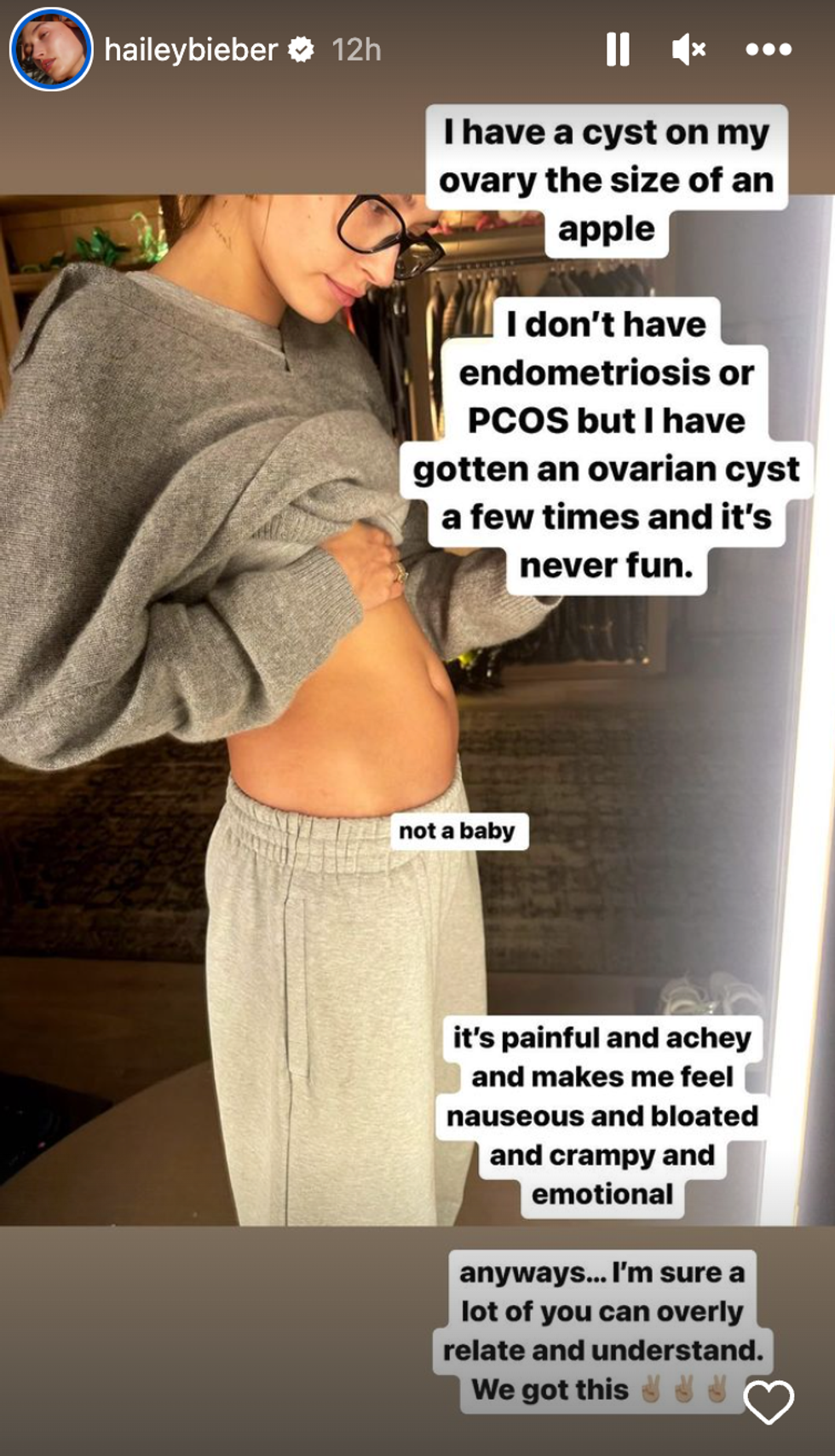"I don't have endometriosis or PCOS [Polycystic Ovary Syndrome] but I have gotten an ovarian cyst a few times and it's never fun," she wrote in the post.
"It's painful and achey and makes me feel nauseous and bloated and crampy and emotional," she continued. "Anyways... I'm sure a lot of you can overly relate and understand."
She also put a small caption near her stomach saying, "not a baby."
 Hailey Bieber shared a health update on her Instagram story on November 28.@haileybieber | Instagram
Hailey Bieber shared a health update on her Instagram story on November 28.@haileybieber | Instagram
Hailey and her husband, Justin Bieber, currently have no children.
Here's everything you need to know about what ovarian cysts are, signs to watch out for and whether they will affect your pregnancy.
What is an ovarian cyst?
According to the Cleveland Clinic, an ovarian cyst is a "sac filled with fluid or semisolid material that forms on or within one of both of your ovaries."
The clinic notes that these cysts are very common, and can affect anyone with ovaries.
Ovarian cysts are more common for women who haven't gone through menopause yet, who have a history of them and for those people with certain medical conditions like endometriosis or hormonal problems.
The growths are also more likely to form when a woman is pregnant and may remain throughout the pregnancy, the clinic says.
Is an ovarian cyst a serious problem?
The Mayo Clinic says cysts are harmless and most of the time the growths will go away without treatment within a few months.
While it is rare, a cyst can lead to complications if it breaks open.
What are the symptoms of an ovarian cyst?
Some people won't know they have an ovarian cyst because they typically don't cause any symptoms.
You may only find out about it during a pelvic exam or imaging procedure, as explained by the Cleveland Clinic.
However, a large ovarian cyst can cause some discomfort.
It may cause a sharp pain in the area below your belly button. It can also cause heaviness in your stomach and bloating.
Will an ovarian cyst affect pregnancy?
Even though a person is no longer menstruating during pregnancy, ovarian cysts are common at this time, especially in the first trimester.
While most of the time the cysts won't cause any harm, there are still complications that can happen if the cyst grows throughout the pregnancy.
According to Penn Medicine, a healthcare company out of Pennsylvania, a cyst may rupture, twist, or cause problems during delivery.
That's why people who are pregnant should make regular visits to an obstetrician or gynaecologist to prevent any complications.
Can you still get pregnant when you have an ovarian cyst?
There are different types of ovarian cysts and depending on which one you have, it could lead to some fertility issues.
The Mayo Clinic says endometriomas cysts, which are caused by endometriosis, and ovarian cysts, which are caused by polycystic ovary syndrome, may be linked to fertility problems in some women.
The cysts that typically don't have an effect on pregnancy are functional cysts, which are the most common type of cyst, cystadenomas cysts and dermoid cysts.
Anyone who has been diagnosed with an ovarian cyst and has questions about their fertility is advised to speak to their doctor.
Do ovarian cysts require surgery?
While most ovarian cysts don't need treatment and will resolve on their own, the University of Utah says there are certain cases where surgery may be required to remove a cyst.
A doctor may advise surgery if a cyst grows beyond 10 centimetres, ruptures and continues to bleed, grows after menopause, is cancerous, is noncancerous but causes symptoms, or if the cyst twists.

 Screenshot of Selena Gomez's story.
Screenshot of Selena Gomez's story. Screenshot of Hailey Bieber's story on March 24, 2023.
Screenshot of Hailey Bieber's story on March 24, 2023. Hailey Bieber shared a health update on her Instagram story on November 28.
Hailey Bieber shared a health update on her Instagram story on November 28.